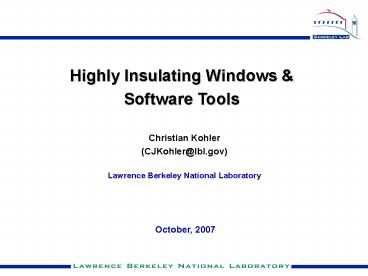Christian Kohler - PowerPoint PPT Presentation
1 / 26
Title:
Christian Kohler
Description:
Christian Kohler (CJKohler_at_lbl.gov) Lawrence Berkeley National Laboratory ... Model 'standard houses' in 5 different locations. Vary windows from very ... – PowerPoint PPT presentation
Number of Views:176
Avg rating:3.0/5.0
Title: Christian Kohler
1
Highly Insulating Windows Software Tools
Christian Kohler (CJKohler_at_lbl.gov) Lawrence
Berkeley National Laboratory
October, 2007
2
Goals for Highly Insulating Windows
- Windows that gain as much heat from the sun as
they lose.
3
Defining Zero Energy Windows
- Zero Energy Windows have a net-zero annual energy
balance - Approach
- Model standard houses in 5 different locations
- Vary windows from very insulating to very bad
- Vary windows from high solar gain to low gain
- Plot the results in a graph
4
Performance Goals
More Insulating
More solar gain
5
Minneapolis
6
Non-structural center-layers
- Current technologies for highly insulating
products use multiple layers of low-e and gas
fill - All glass is heavy
- Thin film products expensive
- Multiple spacers can lead to gas leakage
- LBNL research aims to develop lower-cost,
non-structural center layers - Utilize available low-e and gas-fill technologies
- Research novel center layer designs and materials
7
Non-structural center-layers
- Acrylic center layer
Plastic layer
8
FY07 Non-structural center-layersThin glass
- Very thin glass (e.g. .7mm) is now available in
large sizes as a result of LCD and Plasma TV
markets - Prices are falling rapidly as volume increases
- Samples recently received from Corning
- IGs to be built in 08
- Will center layers bow? depends on how they are
positioned - Cost and Handling issues?
0.7 mm (0.028)
1.1 mm (0.043)
3 mm (0.118)
9
Prototype Testing ResultsSimple insert performs
as well as fixed layer
10
Software Tools
11
Modeling
12
Software Tools
13
Chinese version of WINDOW6
14
Thank you. Christian Kohler Windows and
Daylighting Research Group CJKohler_at_lbl.gov
15
FY07 Non-structural center-layersStructural
Issues Acrylic
- CYRO, leader in production and development of
acrylic for fenestration products, is supplying
us with various types of acrylic sheet to better
understand which type of acrylic sheet is suited
to center-layer applications
16
Heat Transfer through Windows
Low-e coatings
Radiation
Conduction
Special gas fills Multiple cavities
Convection
Low conductance spacers Better frames
Conduction (convrad in cavities)
Primary Driver Indoor/outdoor temperature
difference
17
FY07 Non-structural center-layersSpacers and
sealants
- Super spacer, Swiggle-strip grooves for 3 layer
design used in prototyping - New BASF TPS technology BASF visit to LBNL and
continued discussions
18
Non-structural center-layers FY08
- Resolve issue of why acrylic layers deflect and
determine what if any upgrades are needed - Field-expose (at LBNL) samples
- Understand potentials of thin glass
- Continue/expand contacts with industry to explore
cost, availability, business issues - Window and IG manufacturers
- Spacer manufacturers
- Production Equipment manufacturers
19
FY07 Low-conductance Frame Heat Transfer
- For residential sized windows (6-10 sf total) the
frame is 20-30 of area and thus a critical
element of a high R window - Little experience in the U.S. with highly
insulating frames - Turn to Europe for Review of European
low-conductance frames - How do we assess actual performance of a
low-conductance frame? (see related Software
Tools effort)
20
FY07 Low-conductance Frame Heat Transfer
Review of European frames
- Driven by Passivhaus requirement
- Ult 0.8 W/m2-C (.14 IP)
- Literature review in collaboration with Arild
Gustavsen, Norway - Two themes
- More highly insulating frames
- Lower profile frames to capitalize on solar gains
21
Low-conductance Frame Heat Transfer Insulating
European frames
- Wood Frame with PUR
22
Low-conductance Frame Heat Transfer Insulating
European frames
- Wood Frame with Insulation Filled Al cladding
23
Low-conductance Frame Heat TransferFY08 plans
- Analysis of methods used in European frames
- Use/positioning of thermal breaks, cavities
- Hardware impacts
- Spacer impacts
- Analysis of other issues
- low emittance cavities
- phase change frames
- Testing
- IR (LBNL)
- Hot box (Norway)
- Performance issues (see Tools work multi-year
effort not currently funded) - Continued collaboration with A. Gustavsen
24
Field Tests
- Objectives
- Document field energy performance and non-energy
benefits of todays highly insulating windows - Improve homebuilders familiarity with highly
insulating windows - Generate manufacturer interest in applications
- Projects
- Field demonstrations in Building America test
houses - Installation and monitoring of highly insulating
windows vs. standard ENERGY STAR in collaboration
with Cardinal IG in identical houses in Ft.
Wayne, Indiana
25
Low-Energy Home Demonstration FY07
- Affordable home in MA (CARB Building America
team) - Heat Mirror (U0.2) windows provided by builders
normal supplier at no price premium - Typical price premium strongly related to special
order process - Compared window-surface temperatures against
baseline windows
26
Interior Surface Temperatures
Double, clear
Heat Mirror
27
Cardinal Test Houses - Indiana
- Standard low-solar gain low-e vs. triple-pane
with high-solar gain and insulated frames (Ult.2) - Side-by-side houses have been monitored, empty,
since Jan 2007 - Prior years data on typical Energy Star windows
also available































